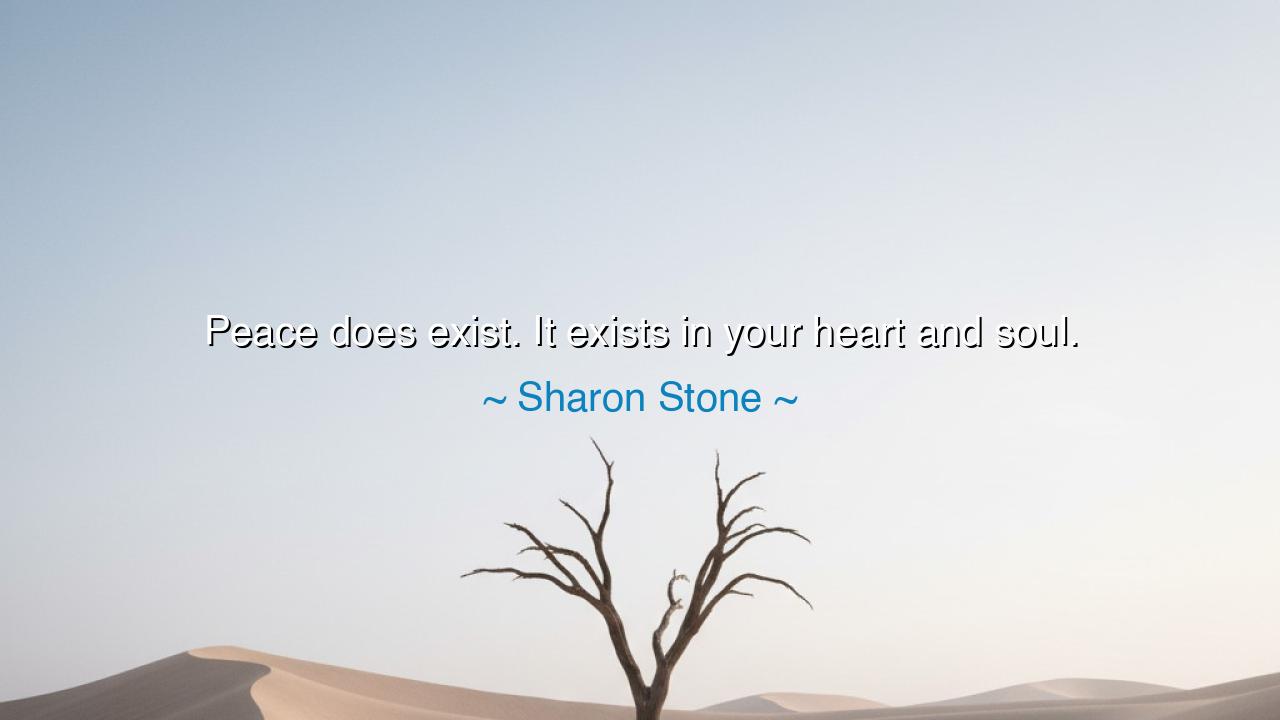
Peace does exist. It exists in your heart and soul.






"Peace does exist. It exists in your heart and soul." These words, spoken by Sharon Stone, speak to the profound truth that true peace is not something we find in the world outside, but within ourselves. While the world around us may be filled with chaos, conflict, and unrest, the heart and soul hold the key to inner peace. It is within the depths of our own being that we can cultivate a peace that transcends the turmoil of the external world. Stone’s reflection is a call to look inward, to seek serenity, balance, and harmony in the midst of life's challenges. It reminds us that while we may not control the events that unfold around us, we hold the power to decide how we respond to them—whether we react with fear, anger, or, instead, with peace.
In the ancient world, peace was often understood as something that began with the individual, a state of being that must first be cultivated within the soul before it could ever spread to the community. The Greeks, particularly in the philosophy of Socrates, believed that true peace was found through the cultivation of virtue and wisdom. To Socrates, the peace of the soul was the highest form of human flourishing, for only when the soul was at rest could one act justly and harmoniously in the world. The ancient philosophers taught that peace was not a passive state, but a dynamic force that required constant reflection, balance, and the pursuit of the greater good. Stone’s words echo this ancient understanding: peace begins within, in the heart and soul of each individual, and radiates outward as we align ourselves with our deepest values.
This understanding of inner peace was central to the teachings of the Buddha, whose path to enlightenment was grounded in the belief that true peace comes from detachment from the external world and the stilling of the mind. The Buddha taught that suffering arises when we are caught in the desires and attachments of the material world, and that to achieve peace, we must learn to transcend these attachments. Through mindfulness, compassion, and meditation, one can come to a place where the storms of the outer world no longer disturb the calm of the inner self. Like Sharon Stone, the Buddha understood that peace is not something to be found in the external world, but is something that can only be nurtured within the heart and soul of each person.
Consider the example of Nelson Mandela, whose life was marked by profound inner peace despite the immense struggles he faced. After spending 27 years in prison under the brutal regime of apartheid, Mandela emerged not with bitterness or a desire for vengeance, but with a commitment to reconciliation and peace. He had found within himself the ability to forgive, to heal, and to embrace a nation torn by racial division. His inner peace was a driving force behind his ability to lead with wisdom, patience, and understanding. Mandela’s example teaches us that true peace is not the absence of conflict, but the ability to remain calm, to stay centered, and to respond to violence and hatred with love and forgiveness. His inner peace became the foundation for a nation’s peace.
Yet, inner peace does not mean passivity; rather, it is the strength to face the trials of life without being consumed by them. The Roman Stoics, particularly Marcus Aurelius, taught that we should not seek to control the world around us but rather to master the way we respond to it. Aurelius, in his Meditations, reflects on the importance of cultivating inner peace by focusing on what is within our control: our thoughts, our actions, and our attitudes. His wisdom aligns with Stone’s view that peace is found in the heart, and that by shaping our inner world, we can find serenity in the midst of chaos. The Stoics understood that the path to peace was not one of passive resignation, but of active engagement with the world, grounded in self-control and inner calm.
The lesson from Sharon Stone's words is clear: peace must begin within, in the deepest recesses of the heart and soul. The outer world may be filled with struggle, pain, and suffering, but we can choose to cultivate serenity within ourselves. This is not to deny the realities of external conflict, but to recognize that we have the power to shape our response to it. In the face of life’s challenges, we must ask ourselves: How can we cultivate peace within? Are we looking for peace in the wrong places—externally, in the world of things, of status, or of success—when it is truly found within us?
To achieve this inner peace, we must turn inward and engage in practices that nurture our soul—whether through meditation, self-reflection, kindness, or simply embracing the present moment with acceptance. We must learn to let go of what we cannot control, to forgive ourselves and others, and to create a space within where serenity can thrive. The wisdom of Socrates, Buddha, Mandela, and Aurelius teaches us that peace is not a distant dream, but a living reality that we can cultivate every day, from within. May we all strive to create a world where peace is not just an external goal, but a constant companion within our hearts and souls.






AAdministratorAdministrator
Welcome, honored guests. Please leave a comment, we will respond soon